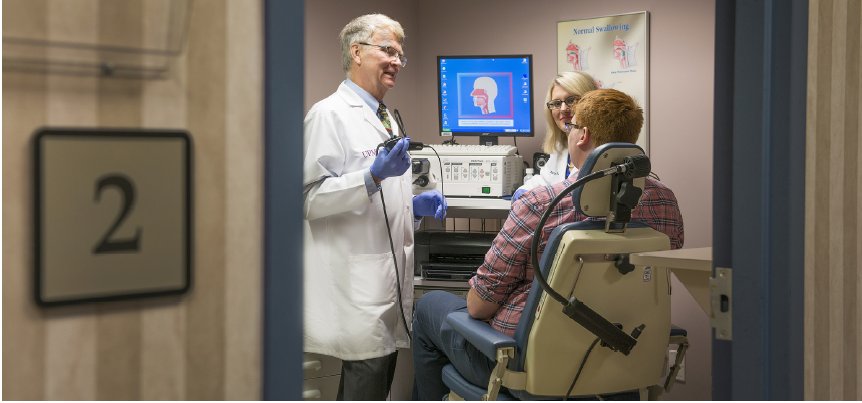Sight + Sound, Fall 2020
by Carrie Fogel
More than half a million head and neck cancers are diagnosed each year globally, with an increased amount of cases being found in a much younger population. Younger men and women without the traditional risk factors, like tobacco and alcohol use, are part of a growing population of patients who develop the disease from the human papillomavirus. The majority of patients with head and neck cancer (HNC) present with an advanced stage of the disease and require treatment with multimodal therapy, which includes a combination of surgery, radiation, and chemotherapy. Although these aggressive treatment regimens have resulted in increased survival, especially for those with human papillomavirus (HPV) associated HNC, this improved survival comes at a cost to the survivors, compromising their functional capacity and physical health, and impacting the family or support network of the survivor.
As the intensity of the standard treatment protocol has amplified, survivors experience a substantial increase in acute and late treatment-related toxicities, resulting in the need for emergency room and inpatient visits. A retrospective analysis showed that of 147 head and neck cancer patients undergoing a combination of radiation and chemotherapy at our institution, 37% are hospitalized during or shortly after treatment. The main reasons for Emergency Room visits and hospitalization were dehydration, difficulty swallowing, pain, nausea/vomiting, fever, and sudden drop in blood pressure.
In 2016, Jonas T. Johnson, MD, Chairman of the Department of Otolaryngology at the University of Pittsburgh, and Marci Nilsen, PhD, RN, Assistant Professor in the Department of Acute and Tertiary Care in the University of Pittsburgh School of Nursing joined together to establish the UPMC Survivorship Clinic for Head and Neck Cancer. In addition to improving the care that survivors receive by coordinating care and providing patients with comprehensive plans for their recovery, Drs. Nilsen and Johnson are beginning important research trials that offer new models of care and study their efficacy.
With nearly three years of data collected from patient-reported outcome surveys, which assess patients’ most common symptoms and problems they face during and after treatment, we are now uniquely positioned to implement a pilot project to enhance care coordination and reduce hospitalization for HNC patients. To do this, support is needed to secure the time of two healthcare providers, a registered nurse, and a speech-language pathologist, to implement the project two days per week.
The Enhanced Care trial places two healthcare providers embedded at Shadyside Hospital, two days per week, to enhance symptom monitoring and better coordinate care during and immediately after completion of therapy when patients are suffering from acute effects. The intent is to reduce hospital utilization (i.e., hospital admissions, emergency room visits, inpatient observation) by 15%. Dr. Johnson and Dr. Nilsen believe that this can make a difference in the experience that patients have during treatment by deploying interventions early and making patients aware that there exists a first point of contact who they can reach out to as soon as symptoms of their treatment arise.
This project represents a transition toward improved value of healthcare. The UPMC Hillman Cancer Center has recognized the need to improve and expand the type of Survivorship Care that is offered. With the support of Dr. Robert Ferris, Director of UPMC Hillman Cancer Center, Associate Vice Chancellor for Cancer Research, and Professor of Otolaryngology, of Immunology, and Radiation Oncology, the Head and Neck Survivorship Clinic is implementing this pilot project at the Hillman Cancer Center in Shadyside.
Additionally, the UPMC Health Plan is introducing the use of coordinated care through the Oncology Care Model of reimbursement for Head and Neck Cancer patients. Our pilot project will collect and present data to the Health Plan, which is essential to establish the value of this approach. Coordination of care and enhanced navigation can lead to reduced hospital visits and cost savings. If successful, it will form a basis for reimbursement of coordinated care.
This project is generously supported by the Beckwith Foundation and the Barton Family.
